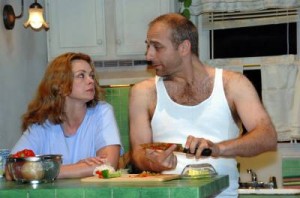
Frankie and Johnny were lovers and (as the song goes), “Oh Lordy, how they could love,” that is until she caught Johnny cheating on her “with that high-browed Nellie Bly” and shot him dead.
Fortunately, things are a good deal more hopeful for the lovers in Terrence McNally’s moving two-character, two-act dramedy, Frankie And Johnny In The Clair De Lune, now playing at International City Theatre in Long Beach. With the superb Libby West and Thomas Fiscella in the title roles and master director Todd Nielsen at the helm, ICT’s production proves to be one of their finest.
We first meet early-fortyish Frankie and late-fortyish Johnny in Frankie’s apartment, basking in the afterglow of passion, their first time together after having worked over the past months in the same New York diner, Johnny in the kitchen and Frankie waiting tables. It is Johnny who has pursued Frankie, totally smitten by the attractive but cynical waitress, Johnny who can’t stop talking once the sex, or at least the first sex of the evening, is over.
“It’s Johnny, please,” Johnny tells Frankie when she mistakenly calls him John. “John sounds like a toilet or a profession. And Jack only works if you’re a Kennedy or a Nicholson.” And when Frankie attempts to answer Johnny’s query, “Do you think I talk too much?”, he interrupts her to talk some more, a man in love with the sound of his own voice, though not nearly as much as he is with Frankie. “I want to drown in this woman,” he tells her. “I want to die here.”
“You know, you’re a very intense person,” she replies. “Very intense, or very crazy.” Later, she admits, “I do say ‘I’m sorry’ a lot around you. There’s something about you that makes me feel I’m letting you down all the time.”
Whatever insecurities Frankie may have, they’re based more on her own self-image than on the very attractive, if a bit worn-down woman we see on stage. “I’m empty,” she confesses to Johnny after their lovemaking. “There’s no more where that came from.”
Frankie’s only “life” is the one she gets from observing her neighbors a la Rear Window—the couple who never once speak to each other and the battered wife who tells Frankie “I have no idea what you’re talking about” when Frankie attempts to help her one day in the A&P.
And as for romance in her own life, she tells Johnny that “romance is seeing someone for what they really are and still wanting them warts and all,” and Frankie can’t believe that anyone, especially Johnny, the Romantic in love with Romance, could ever see past the emotional and psychological warts that life has covered her with.
As Frankie And Johnny In The Clair De Lune unfolds in real time, we come to care about these two lonely people. Though in great physical shape, Johnny is no George Clooney in the looks department, and Frankie could stand a shampoo and styling, and a bit of lipstick. Yet pretty much from the play’s opening moments, we know that these two “strangers in the night” are, or at least can become, beautiful in each other’s eyes. If ever two disparate (one of Johnny’s favorite words) people were made for each other, they are Frankie and Johnny, and our fingers are crossed that McNally will give them the happy ending they each deserve.

Frankie And Johnny In The Clair De Lune proves that Pulitzer Prize nominee and 4-time Tony Award winner McNally is as adept at writing about male-female relationships as he is about men in his better known gay-themed plays. Unlike the film version with Michelle Pfeiffer and Al Pacino, which expanded the play to show Frankie and Johnny’s lives in and out of the diner before their night together, Frankie And Johnny In The Clair De Lune never leaves Frankie’s apartment. With only two actors on stage, the play clearly depends on the caliber of performers in the title roles. Fortunately, in West and Fiscella, Frankie and Johnny are in more than capable hands.
West is to the Los Angeles stage scene what Naomi Watts is to the movies, an actress who not only works constantly (already quite a feat) but never plays the same kind of role twice. From the beautiful small town girl in Picnic to the glamorous Hollywood movie star in Twentieth Century to her recent star turn as real-life Joan Plowright in Orson’s Shadow, West has proven herself the personification of versatility. Here she underplays her natural good looks, face devoid of makeup, hair hanging limply, and nasal voice (and near bray of a laugh) straight out of Brooklyn or Philly. West captures all of Frankie’s loneliness, defensiveness, and cynicism all the while giving us glimpses of the hope that occasionally surface.
Fiscella’s performance is big and bold and beautifully unrestrained. Johnny isn’t afraid to wear his heart on his sleeve and though his loquaciousness (he’d like this word) can occasionally be a bit too much, it’s because he’s got so much to say to Frankie, and he knows that this may be his one and only chance to open his heart to her. In Fiscella’s gifted hands, there’s no way that Frankie could not end up under his spell.
Director Nielsen’s work is invisible here, the best kind of direction for an intimate play like Frankie And Johnny In The Clair De Lune, a collaboration between performer and director in which the latter’s work can best be perceived through that of the former.
Stephen Gifford’s set design is one of the best ever at ICT, a perfectly conceived New York studio apartment filled with property designers Patty and Gordon Briles’ creative details—ironing board and vacuum against the wall, dishes in the kitchenette sink, and stacks of books under the table beside the armchair where Frankie reads or watches TV. Chris Kittrell’s lighting and sound design complement each other beautifully. Frankie’s apartment appears actually to be lit by its table lamps, the light above the stove, and the moonlight shining through the windows. In the background can be heard soft melodies from the local classical music station, including the Debussy tune which figures in the play’s title.
Frankie And Johnny In The Clair De Lune is a play for romantics and cynics alike, and in a production as fine as this one, cynics may just find themselves letting down their own defenses a bit, as Frankie herself does on one moonlight New York night.
International City Theatre, 300 East Ocean Blvd., Long Beach.
www.ictlongbeach.org
–Steven Stanley
September 4, 2008



 Since 2007, Steven Stanley's StageSceneLA.com has spotlighted the best in Southern California theater via reviews, interviews, and its annual StageSceneLA Scenies.
Since 2007, Steven Stanley's StageSceneLA.com has spotlighted the best in Southern California theater via reviews, interviews, and its annual StageSceneLA Scenies.







 COPYRIGHT 2024 STEVEN STANLEY :: DESIGN BY
COPYRIGHT 2024 STEVEN STANLEY :: DESIGN BY